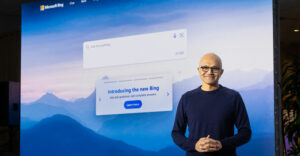
Facebook and Bing have teamed up in a move that could bring a touch more sociability to online search.
Facebook users will see Web pages their friends like popping up when they launch a Bing search while logged into the social networking site. Further, when Facebook users search for their friends on Bing, people with whom they have Facebook friends in common will top the results.
The service is already available to two percent of Facebook subscribers in the United States, and it will roll out to the rest in the next few weeks, Facebook spokesperson Malorie Lucich told TechNewsWorld.
Both Microsoft and Facebook say they’ll safeguard users’ privacy, an issue over which Facebook has often taken a beating.
Why Bing Friends Facebook
Search is becoming more personalized and social at the user level, but the traditional method of using clues, or signals, to best match a search can be further improved, wrote Satya Nadella, senior vice president of Microsoft’s Online Services Division.
These traditional signals depend on how information is connected, but in the real world, such connections aren’t enough; you have to also look at the connections between people, Nadella wrote. Adding a social layer to a search makes the process of connecting to information and making decisions more social, personal and useful.
“Fifty percent of people say that when making a decision, they take into consideration thoughts shared by others in their circle of friends,” Nadella wrote, although he didn’t cite the source of this statistic.
No matter; by teaming up with Facebook, Bing gets to use a new signal that goes beyond mere pattern recognition or keyword matching, Nadella wrote. This will make for better search results because they will include results that people whom searchers trust find interesting.
Basically, Bing will include two new features now: “Liked Results” — which shows what your friends like when you launch an online search while in Facebook — and “Facebook Profile Search.”
The “Facebook Profile Search” feature narrows down the search by listing people who share mutual Facebook friends with the searcher at the top of the results, wrote Bing executives Paul Yiu and Todd Schwartz.
Search Engines Who Need People
“I feel like there’s a quote in here somewhere — who’re you going to believe? The Internet or your lying friends?” Carl Howe, director of anywhere consumer research at the Yankee Group, told TechNewsWorld.
“Some consumers want facts, while others want opinions and still others want both,” Howe added. “The problem is that different sources of information are better for different goals. Friends are great for opinions, but they may not be such great sources for hard facts,” he said.
However, the Bing-Facebook team-up may lead to problems for the two.
“This feels like Bing and Facebook are trying to tap into personal data in a way we haven’t seen before, and I think there’s some danger of a backlash,” Howe warned. “After all, these results don’t just return information about friends, but also friends’ histories of what they like and dislike. Just because you may have been fond of Jell-O shots as a college student doesn’t mean you want that information hanging around for your new friends at work to browse.”
Every Step You Take
Perhaps in anticipation of a backlash from privacy advocates, both Facebook and Microsoft contend that they’ll protect users’ privacy.
Bing is one of several partners Facebook has teamed up with in its “Instant Personalization” project — others are Rotten Tomatoes, Docs.com, Pandora, Yelp and Scribd.
All partners have to adhere to Facebook’s guidelines and can only use subscribers’ public information — which they share with friends on the social networking site — to serve up a personalized experience, Facebook said. This information cannot be transferred to advertisers or used for any other purposes.
Microsoft, too, will focus on user privacy. Bing’s “Liked Results” will only include content designated as public and is the same information available to the searcher’s Facebook friends, Microsoft’s Yiu and Schwartz wrote.
Further, consumers will be notified in advance that their search will be enhanced with “Liked Results” and they can disable the feature if they launch a Bing search without being logged into Facebook. There are other restrictions on information what users can see, and their friends won’t be able to see what they’re searching for.
Finally, Facebook requires users to be at least 13 years old to access its services, and Bing’s Facebook Profile Search will only serve up results for users who list themselves as 18 years or older in their Facebook profiles.
“Neither Microsoft nor Facebook is tracking data from this integration, and Microsoft does not log search history tied to a user’s profile on Facebook,” Facebook’s Lucich said. “By technical design, Facebook does not receive any search queries from Bing except for people searches.” Facebook deletes queries within 24 hours, she pointed out, adding that search queries are not shared with a user’s Facebook friends.
The Love of Money
Data generated from tracking online searches and the people with whom the searcher communicates about the search results can help build up a powerful profile of a user.
“Microsoft and Facebook really want to know their users intimately so they can serve up better services, offer up more targeted advertisements and make themselves more valuable to advertisers,” Rob Enderle, principal analyst at the Enderle Group, told TechNewsWorld. “In the end, they’ll create a virtual you and, if that virtual you is highly modeled, it will have a very high value to advertisers.”
How long can the two resist the monetization that could result from collating such data?
That’s difficult to say. After all, Google’s monetizing its online search results quite profitably.
Shaking Up Online Search
The partnership between Facebook and Bing will likely impact online search heavily.
“This creates an uber-portal on Facebook that does change the game,” Enderle said. “It will put a lot of pressure on Google to do something similar. Google will have to get into the social networking space.”
Google “may try to address the market created by this alliance, but they’ll probably do so in a more thoughtful and careful way,” Howe said.




















































